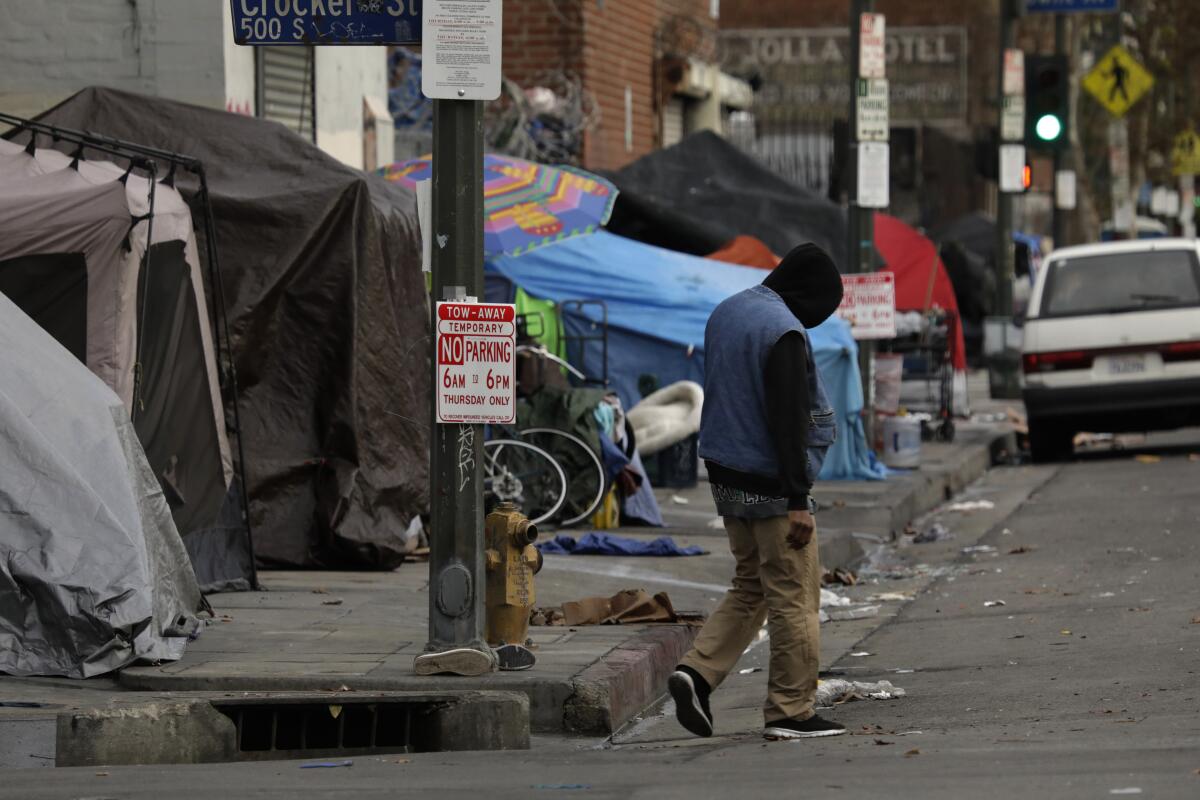He wanted to ban feeding homeless people. Now he’s about to lead a federal homeless agency

A consultant known for urging cities to stop “enabling” homeless people, in part by blocking charities from handing out food, has been tapped to lead the agency that coordinates the federal government’s response to homelessness.
Robert Marbut, who has worked with several California counties and cities, including with business leaders in Fresno, would succeed Matthew Doherty as executive director of the U.S. Interagency Council on Homelessness.
Doherty, an Obama administration appointee, was ousted by the Trump administration last month. On Wednesday, Gov. Gavin Newsom announced that Doherty will serve as a new advisor to California, helping the state create a federal advocacy agenda on homelessness.
The shift in leadership comes as President Trump has repeatedly vowed to crack down on street encampments in Los Angeles, San Francisco and elsewhere in California.
In September, a coterie of officials from the Trump administration came to Los Angeles to study homelessness. The trip was led by Ben Hobbs, White House special assistant for domestic policy, and included officials from the departments of Veterans Affairs, Health and Human Services, Housing and Urban Development, Justice and the Environmental Protection Agency.
“We have people living in our … best highways, our best streets, our best entrances to buildings ... where people in those buildings pay tremendous taxes, where they went to those locations because of the prestige,” Trump said during the visit. “And all of a sudden they have tents.”
Still, it’s unclear what Marbut’s appointment will mean for California, home to the nation’s largest homeless population. Legally, the Trump administration has limited options to open shelters or use police to clear encampments — although there is some appetite among L.A. County residents to have law enforcement be more involved.
Marbut did not immediately return a call for comment.
His appointment is contingent on final approval at the council’s Dec. 10 meeting, the agency’s communications director, Jennifer L. Rich, told The Times on Tuesday night.
The U.S. Interagency Council on Homelessness is a relatively small agency, but it is responsible for coordinating programs and investment dollars across 19 federal departments, including Housing and Urban Development, Education, Labor and Commerce. The agency also works with states and the private sector.
Marbut, a Texas-based consultant sought after by communities looking for ways to address homelessness, has long encouraged elected officials to stop coddling people on the streets.
In 2012, he pushed the Florida city of Clearwater to stop “renegade food” donations from churches and other charitable organizations. At the time, he characterized Clearwater as the second-most enabling city in America.
“No one has got out of homelessness just because they got fed,” he told the Tampa Bay Times. “That has never happened.”
Marbut went undercover that year to observe the homeless population. His plan called for the city to stop people from sleeping in public and from panhandling, and expand the authority of police to crack down on minor offenses, among other steps — all of which squared with the “seven guiding principles” listed on his now-deleted website.
“When I go into a city, I say if you really want a reduction, we’re able to get about an 80% street reduction,” Marbut told NPR in 2014. “But to do that, you have to totally retool everything you’re doing. You can’t be feeding on the street. But likewise, you have to provide and enhance and sometimes create programs that address the root causes, because hunger is not the root cause of homelessness.”
Marbut also has been skeptical of “housing first,” the widely accepted model that prioritizes getting people off the streets before focusing on other issues of mental health or substance abuse. The federal agency he is poised to lead has long pushed the strategy as the best way to reduce homelessness.
Iain De Jong, a consultant who also works with cities and counties on homelessness, said that Marbut’s approach is not grounded in best practices, isn’t effective and is outdated.
“His track record would suggest that he has a lot of work to do to restore faith among people who work in this industry,” De Jong said.
Here is a presentation given by Iain De Jong about some of the flaws in Robert Marbut’s approach to handling homelessness.
Eric Tars, an attorney with the National Law Center on Homelessness & Poverty, said he is worried Marbut will move the Interagency Council on Homelessness, and by extension the federal government, away from encouraging communities to adopt the “housing first” model.
Tars pointed to Marbut’s work in Pinellas County in Florida as an example of what not to do.
There he worked with the Sheriff’s Department to create a shelter that functioned as a jail diversion program for just homeless people. Residents had to earn the privilege of sleeping indoors on bunk beds, and if they broke any rules, they were moved outdoors for up to 15 days, according to a 2013 report from the National Law Center on Homelessness & Poverty.
“The primary concern is that his approach, and what we see signs of from the administration wanting to do, is going to encourage greater enforcement of laws criminalizing homelessness with all the collateral damage that causes,” Tars said.
Broadly, Marbut’s philosophy is in line with many of the views espoused by the Trump administration.
In September, the White House Council of Economic Advisors issued a report on homelessness that mostly focused on how streamlining housing regulations could help solve the crisis. It also insisted that hospitable conditions for sleeping on the streets and better access to shelters lead to an increase in the homeless population by making people comfortable.
Such thinking has been roundly criticized by homeless advocates as too harsh, particularly in places such as Los Angeles where there aren’t enough shelter beds or affordable housing to bring people indoors.
“He clearly has a patronizing, condescending and shaming-and-blaming approach that may hide homelessness from downtown businesses,” said Diane Yentel, president and chief executive of the National Low Income Housing Coalition.
“But it does nothing to end or even alleviate homelessness. His goal is to fix what he perceives to be individual flaws while ignoring all the really clear structural problems that create this. It feels like a throwback to a centuries-old ideology that hearkens back to the poorhouses of the 19th century,” Yentel added.
Responding to homelessness has long been seen as the domain of local governments. But as the crisis has worsened, local and state leaders have called for more federal action — on everything from investments in affordable housing to expanding shelter assistance programs.
Newsom’s administration is using part of its budget surplus for $650 million in emergency homeless aid — an increase from the $500 million allotted last year.
The state is giving cities and counties wide latitude in ways to spend the money. How that money will be split up, however, will depend on the data on the homeless population reported to the federal government, which haven’t been released yet.
Newsom on Wednesday accused the Trump administration of slow-walking the process. The population data are typically released in late November.
The governor also praised Doherty, who previously worked on housing and homelessness issues in San Diego.
“I have seen firsthand that cities and states acting alone are not going to be able to fund the solutions that are required to meet this challenge,” Doherty said in a statement about his new appointment to the position in California. “Much more federal investment is needed to make meaningful progress and solve this crisis.”
Asked about Marbut’s appointment, Los Angeles Mayor Eric Garcetti told reporters Wednesday that he welcomes “anybody to this fight” of ending homelessness.
“I don’t care what people have done in the past, what they have said,” Garcetti said. “I’m interested in what they’re willing to do.”
Times staff writer Dakota Smith contributed to this report.
More to Read
Start your day right
Sign up for Essential California for news, features and recommendations from the L.A. Times and beyond in your inbox six days a week.
You may occasionally receive promotional content from the Los Angeles Times.







